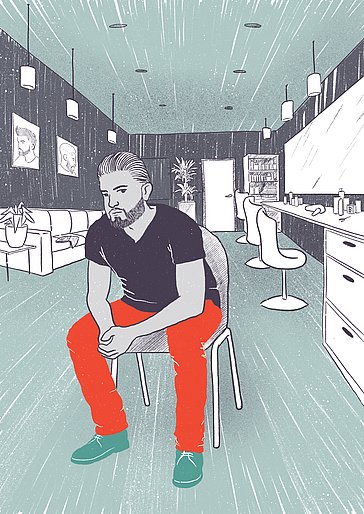
NORTHERN IRAQ
A success? Statistically speaking
Hassan Al Mohami: Northern Iraq – Germany – Northern Iraq
Hassan Al Mohami* came to Germany via Turkey and Greece at the end of 2017. At the beginning it was not easy: life at the initial reception centre and then in a collective camp in a small town near Heidelberg was characterised by uncertainty and isolation.
Why had he left home in the first place? His partner’s parents were against their relationship and had made massive threats. Hassan had to leave and ended up in southern Germany. Looking back, he says that he felt comfortable there and would have liked to stay. The authorities granted him tolerated status and despite all the difficulties finding work, he believed in a future in Germany. He had his goals in mind and wanted to build a new life for himself.
But then his mother suddenly fell seriously ill. She asked Hassan to come home and he decided to return. He had already heard about the possibility of a sponsored return from Germany during the asylum procedure, so he sought advice on this from a government agency and prepared his departure. This included attending a business start-up seminar and drawing up a comprehensive time and cost schedule for setting up his own business. Together with the return counselling, he decided to open a hairdressing salon back in Erbil. After he had completed the preparations and the business plan had been forwarded by the return counselling service to the responsible European Technology and Training Centre (ETTC) in Erbil, he left Germany. The preparation had given him hope that he would actually be able to build something and provide for himself and his mother.
Planning without attending to needs
It sounds like a flawless reintegration. Hassan also stresses that the “support was helpful”. But he also puts his finger on the problem: “There are extremely many barbershops here.”And thus too few customers. “My income is not even enough to pay the rent. Sometimes I work as a day labourer at construction sites on the side.” In the preparatory courses in Germany and the review of the business plan, no one was concerned about whether opening another hairdressing salon in Erbil would be promising or not from a business point of view. The main thing was that there was a business plan and hence a successful return ... Hassen says that the Deutsche Gesellschaft für Internationale Zusammenarbeit (GIZ) recently offered him financial support to expand the business. This puzzled him: “They knew about the bad customer situation and yet they wanted to enlarge my shop? That makes no sense at all.” Possibly the reintegration support on the ground was under “pressure to spend funds – i.e. use it or lose it”. An enlargement could be registered in the statistics as a successful reintegration project. Everything else seems to be secondary - including Hassan’s thoughts about leaving for Europe again.
* The names have been changed by the editors.
